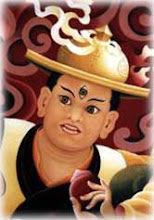Regarding his ban of the practice of the Wisdom Buddha Dorje Shugden, the Dalai Lama said on 27 March 2006:
"... most of the concerned people have been able to make a proper choice between what to accept and what to reject in this matter, I felt an urge to thank you all for it. This activity which concerns the well being of our faith should not begin and end like the Chinese campaigns, which start suddenly to deal with an urgent current concern and then, after a while, calm down to eventually, sort of, die out. We should be able to carry forward to a successful conclusion the work that we have started in the matter.
Those who practice Dorje Shugden (called here "Dholgyal" in a derogatory fashion) have no recourse, nowhere to turn. Some are publicly named by the Dalai Lama so they can be dealt with:
There are, however, some cases of people pretending not to have heard what they have heard; especially, there are still some cases in which I feel that persons deliberately practice and propagate Dholgyal. With regard to them, all concerned should think with great caution. To mention specific names in Tibet, there are some local monasteries in Chamdo with their principal of Chamdo Monastery. I do feel that there are people there who are still strengthening their efforts to propagate the practice of Dholgyal Shugden. In the Dragyab region too, some such at the branch Dragyab Monastery and in the Markham region also, I feel that there are people who deliberately retain and propagate the practice. Denma Gonsar passed away last year. In the region where he lived too, there are people who continue and propagate the practice of Dholgyal. In the Rawatoe region of Nyethang there are among the monks and nuns coming to Lhasa from Markham, Dragyab, etc., people who propagate the practice. There are monks from the Markham region who have followed their tradition of joining the Ramoche Temple in Lhasa, where they are still propagating the practice of Dholgyal. Whatever is the case, if such people are designedly reciprocating in negative kind the gratitude we owe to the successive Dalai Lamas and are thereby knowingly showing nothing but scorn for the religious and political causes of Tibet and the kindness of the Dalai Lamas, I have no suggestions to offer. If, nevertheless, I am reiterating my emphasis on the issue, it is because we need to hold as objects of compassion people, if any, who do not know about the issue, or who have not heard about it, or who, out of ignorance, have committed a rash mistake, or who have been led astray by others. All those who know about it have a duty to explain and thereby ensure proper conformity regarding what to accept and what to reject. I too take this as very important."





No comments:
Post a Comment